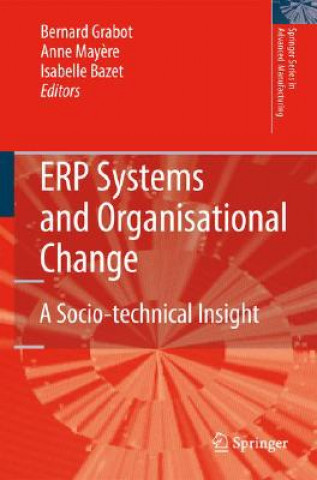
Delivery
Shopping guide





Doesn't suit? No problem! You can return within 30 days
 Gift voucher
any value
Gift voucher
any value
You won't go wrong with a gift voucher. The gift recipient can choose anything from our offer.
ERP Systems and Organisational Change
 English
English
 467 b
467 b
30-day return policy
You might also be interested in


ERP (Enterprise Resource Planning) systems are now the backbone of the information systems in public and private sector organisations. Yet difficulties remain. This book provides a unique and comprehensive insight into ERP systems, from both a social and a technical viewpoint. Without trying to build an artificial consensus, several case studies are commented upon alternatively with a technical and social view, showing how the same facts can have different interpretations.ERP (Enterprise Resource Planning) systems are now the backbone of the information systems in many commercial companies and public sector organisations. The intended benefits of these systems are well known (coping with the fragmentation of former information systems, providing functional integration and supporting best practices for instance). Yet, their implementation in a company is still a traumatising project, with these difficulties being reported in many articles and books explaining reasons for failure, listing conditions of success, or suggesting project management methods aimed at improving their implementation.§A Socio-technical Insight on ERP Systems and Organisational Change is based on the premise that two distinct communities are interested in this problem: engineers and consultants on the one hand, and researchers of Human and Social Sciences on the other hand. The first group often emphasises the technical benefit of the ERP adoption as a source of performance improvement, while the latter group is mainly oriented on the difficulties - and perhaps impossibility - of the adoption of such systems by individuals and organisations.§A Socio-technical Insight on ERP Systems and Organisational Change brings together the views of experts from the two communities to allow for interpretations of the different interrelations amongst ERP systems, organisations and individuals. As ERP systems are software systems that are supposed to support both organisation activity and individual work, the book emphasises not only the influence of the software on the organisation but also how the different ways they are used in practice result in the unpredictable mutual adjustment between those in the organisation and the tool. Together, the chapters illustrate various aspects of this mutual adjustment and are written by engineers, computer scientists, consultants, sociologists, economists and researchers situated in the information and communication sciences. This affords a unique and comprehensive insight into the problem. Without trying to build an artificial consensus, several case studies are commented upon alternatively with a technical and social view, showing how the same facts can have different interpretations providing a better understanding of the phenomenon in question.§A Socio-technical Insight on ERP Systems and Organisational Change is a must-read text for students and researchers in management, engineering science and sociology, as well as for technical and human resource managers and consultants in charge of implementation projects.ERP (Enterprise Resource Planning) systems are now the backbone of the information systems in public and private sector organisations. Yet, even if their ability to address the fragmentation of former information systems, provide functional integration and support best practices is recognised, difficulties remain. These difficulties, arising during and after their introduction in organisations, have been widely discussed, leading to many articles and books explaining reasons of failure, listing conditions of success, and suggesting project management methods that are supposed to allow their harmonious implementation.§ERP systems are clearly software systems which are supposed to support organisational and individual work. Thus, ERP Systems and Organisational Change considers both the social and technical perspectives on this phenomenon. It is necessary to analyse not only the influence of the software on the organisation but also how the different uses made of these systems result in an unpredictable mutual adjustment between those in the organisation and the tool. The book illustrates various aspects of this mutual adjustment, with contributions by engineers, computer scientists, consultants, sociologists and economists which, together, provide a unique and comprehensive view of the problem. Without trying to build an artificial consensus, several case studies are commented upon alternatively with a technical and social view, showing how the same facts can have different interpretations and thus contribute to a better understanding of the phenomenon in question.§ERP Systems and Organisational Change is a must-read text for students and researchers in management, engineering science and sociology, as well as for technical and human resource managers and consultants in charge of implementation projects.
About the book
 English
English
Categories




 How to shop
How to shop
























